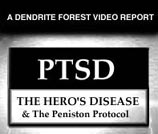Brief presentations of information on
aspects of PTSD:
- PTSD and Community Violence
- PTSD in Children
- PTSD and Problems with
Alcohol Use
- PTSD and Relationships
- PTSD and the Family
- Physical Health and
PTSD
- Survivors of Natural
Disasters
- Epdimological Facts About
PTSD --How
many people exposed to traumatic events have PTSD?
- Disaster and Rescue
Workers and PTSD
- Warning
Signs
Warning signs of trauma-related stress, from Los Angeles County Department of Mental Health.
- Warning
Signs from APA
Warning signs of trauma-related stress, from the American Psychological Assn.
- Victim Emotional Health
Emotional health issues for victims, from the American Red Cross.
- Coping
Suggestions
Coping suggestions, from Los Angeles County Department of Mental Health.
- Normalizing
Emotions
You are not alone! description of normal emotions following a disaster, from the American Red Cross.
-
Post-Traumatic Stress Disorder: An Overview" Matthew J. Friedman
The
Peniston Protocol
PTSD Treatment
LOS ANGELES COUNTY DEPARTMENT OF MENTAL
HEALTH
WARNINGS
SIGNS OF CRITICAL STRESS INFORMATION SHEET
You have experienced a traumatic event. Even though the event may be over, you may now be experiencing or may experience later some strong emotional or physical reactions. It is very common, in fact quite normal, for people to experience emotional aftershocks when they have passed through a horrible event.
Sometimes the emotional aftershocks (or stress reactions) appear immediately after the traumatic event. Sometimes they may appear a few hours or a few days later. And, in some cases, weeks or months may pass before the stress reactions appear.
The signs and symptoms of a stress reaction may last a few days, a few weeks or a few months and occasionally longer depending on the severity of the traumatic event. With the understanding and the support of loved ones, stress reactions usually pas more quickly. Occasionally, the traumatic event is so painful that professional assistance from a counselor may be necessary. This does not imply craziness or weakness. It simply indicates that the particular trauma was just too powerful to manage without help.
Here are some very common signs and signals of a stress reaction:
PHYSICAL SIGNS
Fatigue Nausea Muscle tremors Twitches * Chest pain * Difficulty breathing Elevated BP Rapid heart rate Thirst Visual difficulties Vomiting Grinding of teeth Weakness Dizziness Profuse sweating Chills * Shock symptoms Fainting etc. COGNITIVE SIGNS
Blaming someone Confusion Poor attention Poor decisions Heightened or lowered alertness Poor concentration Memory problems Hypervigilance Difficulty identifying familiar objects or people Increased or decreased awareness of surroundings Poor problem solving Poor abstract thinking Loss of time, place, or person orientation Disturbed thinking Nightmares Intrusive images etc. EMOTIONAL SIGNS
Anxiety Guilt Grief Denial Severe panic (rare) Emotional shock Fear Uncertainty Loss of emotional control Depression Inappropriate emotional response Apprehension Feeling overwhelmed Intense anger Irritability Agitation etc. BEHAVIORAL SIGNS
Change in activity Change in speech patterns Withdrawal Emotional outbursts Suspiciousness Change in usual communications Loss or increase of appetite Alcohol consumption Inability to rest Antisocial acts Nonspecific bodily complaints Hyperalert to environment Startle reflex intensified Pacing Erratic movements Change in sexual functioning etc.
* Definite indication of the need for medical evaluation!
Los Angeles County Department of Mental Health
1 (800) 854 7771

